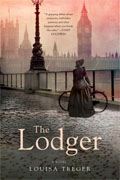The Lodger
Louisa Treger
book reviews:
· general fiction
· chick lit/romance
· sci-fi/fantasy
· graphic novels
· nonfiction
· audio books
· author interviews
· children's books @
curledupkids.com
· DVD reviews @
curledupdvd.com
newsletter
win books
buy online
links
home
for authors
& publishers
for reviewers

 |
The Lodger Louisa Treger Thomas Dunne Books Hardcover 272 pages October 2014 |
|
Treger tumbles us into Edwardian London and the tortured life of English novelist Dorothy Richardson, emphasizing her friendship with her muse and lover, H.G. Wells. An important feminist, Dorothy skirted around the edges of the Bloomsbury set, that community of struggling young writers and radicals who wanted to embrace a new “interior monologue” style that symbolized a melting pot of societies and ideas. Richardson wanted to emphasize the importance and distinct nature of the female experience.
The only breaks from her soul-destroying penury are her weekends at the Wells’s house in rural Kent, where her childhood friend and Herbert’s second wife, Jane, seeks to regenerate Dorothy with sea air and home cooking. As Dorothy seeks solace amid the pansies and delicate foxgloves of the Wells’s sea-facing garden, she can’t find the space to gather up the scattered pieces of herself and glue them back into a semblance of normalcy. These early sections of The Lodger Jane is uneasy and chronically fearful, a jumble of nervous anxiety. Dorothy has reached out to her friend to help reconcile her past self with the “strange adventure” that characterizes much of her present life. Although a sense of belonging is being offered, the friendship is being fractured by Bertie’s endlessly philandering ways. As for Bertie, his sparkling charm is merely a dark cover for his thoughts as he seduces Dorothy, telling her that he is trapped in a domestic circumstance of his own making. Treger has a knack for picking the right detail to convey a mood, a cultural insight, or a social contrast. In London, Dorothy’s daily struggles fuse with brief acquaintances with other struggling city-dwellers, mostly her fellow lodgers. Life is virtually exhausting. Dulled by fatigue and bitterness, Dorothy sleeps in a stifling dusty attic above bustling Euston Road. In this grubby, decrepit, seedy boardinghouse, Dorothy must navigate meddling landlady Mrs. Baker, who although she has a youthful figure and a smile that manages to transcend everything, actually looks more dingy and decayed with each passing day. Far from the comfortable bright rooms of the Wells’s handsome house, it’s not surprising then that Dorothy is drawn to Bertie and his “fugitive impulse.” Even as lodger Benjamin radiates European culture and polish and charm and might endlessly court Dorothy with effusive promises of marriage, Dorothy—at the moment, at least—only has eyes for Bertie. Her conflict is between her need for love and companionship and her yearning hunger to keep her precious independence. Treger unfolds her heartbreaking story from a violent suffragette’s march to a hunger strike in Holloway prison (“a place of horror”) to London itself, “a city of terror, beauty squalor and splendor, an uncaring and indifferent place” that takes Dorothy’s health and devours her youth at every turn. Committing a blissful “unholy act” with lovely Veronica Leslie Jones, Dorothy is plagued by self-doubt and self-hate. She thinks she’s betraying Bertie in her pursuit of her own selfish pleasure, yet for all her confusing and contradictory feelings, she can’t bear the thought of actually letting her famous writer go. Imbuing her novel with a dreamy, aphoristic quality, Treger roots the novel firmly in its historical moment. While the tale’s themes are universal—an exploration of love, anger, grief, and forbidden sexuality—in this moralistic Edwardian world, Treger leaves no doubt in our minds that Dorothy’s intricate, stream-of-consciousness works are her long views of her life at this time and this place in London. In finely wrought, evocative language that blends the startling details of Dorothy’s struggles with her eventual efforts to become a writer on her own terms, the author shows Dorothy’s extraordinary capability to endow her work with a voice that gave it lasting impact. Treger well and truly rises to the occasion, imbuing her simple, heartbreaking narrative with a light drawn from within. Originally published on Curled Up With A Good Book at www.curledup.com. © Michael Leonard, 2014 |
|
|
|
 Click here to learn more about this month's sponsor! |
|
| fiction · sf/f · comic books · nonfiction · audio newsletter · free book contest · buy books online review index · links · · authors & publishers reviewers |
|
| site by ELBO Computing Resources, Inc. | |
 Unable to cope with her severely depressed mother—who later commits suicide—Dorothy subsequently moves to Bloomsbury where she works as a receptionist/secretary/assistant in a Harley Street dental surgery. Existing in a genteel, shabby poverty, life for Dorothy gradually turns inside out. Everything disintegrates even as the grief and guilt over her mother’s death becomes like “splinters of broken glass.” This event has torn Dorothy’s life apart. She can’t erase the image of her mother’s body sprawled on the floor, the “runnels of blood” forming viscous pools on the tattered linoleum.
Unable to cope with her severely depressed mother—who later commits suicide—Dorothy subsequently moves to Bloomsbury where she works as a receptionist/secretary/assistant in a Harley Street dental surgery. Existing in a genteel, shabby poverty, life for Dorothy gradually turns inside out. Everything disintegrates even as the grief and guilt over her mother’s death becomes like “splinters of broken glass.” This event has torn Dorothy’s life apart. She can’t erase the image of her mother’s body sprawled on the floor, the “runnels of blood” forming viscous pools on the tattered linoleum.